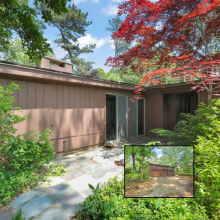Opinion: On the stretch building code in Marion
To the editor:
At the last Select Board meeting, it was standing room only. The topic was the “stretch” building code which qualifies Marion as a Green Community. It was approved some years ago and has benefited Marion through a series of grants from the state. I am not an expert on the grant aspect of the code, but there were some well-respected members of the community who spoke eloquently on the subject. Many people spoke, all good friends and neighbors. I submit the following with all due respect.
The Select Board wanted to alert the town that the “stretch” code has changed and is not the code we approved in 2018. It has become more stringent, more demanding, and it mandates that significant remodeling of any dwelling will trigger requirements that the entire structure conforms to the updated energy efficiency code. Those standards will mean more red tape and more expense to the owner.
The overarching argument is the environmental one. Who doesn’t want to make our contribution to lowering energy consumption and our carbon footprint?
Among other things the new code requires electrification of any new structure. Heating, cooking, hot water. One of my good friends talked about how much cheaper it is to build a house with electric heat rather than conventional oil or gas.
However, mandating all-electric houses is problematic. The grid can’t handle it, and we don’t have power plants. Sending power any great distance from remote power plants can mean losses in transmission of up to 60%. There goes your efficiency.
“Windmills!” said one of the attendees. Well, the grid can’t handle the windmills either. There is already much controversy on that subject, and the fact that substations must be built, the grid must be updated and enlarged… and that doesn’t address the problem of what happens when the wind isn’t blowing and/or there is a winter blizzard and the windmills aren’t turning, either because they have been feathered for their own survival or they are idle. Didn’t we learn that lesson in Texas a few winters ago when all the turbines froze?
We still have no way of storing wind power. That means that conventional power plants are perpetually on standby. The carbon footprint of a coal or gas-fired plant on standby is not pretty. It’s analogous to city driving versus highway driving for a car. They might as well be producing.
And then there is the problem of the windfarms and their output. The test windmills off Block Island are only producing 30% of their expected output. According to a recent story, the Fairhaven windmills are also underproducing. Bloomberg reports that European and UK wind farms have also been overreporting their output.
But there’s another problem. Mandating an all-electric house is setting a trap. First, resistance electric heating is three times as expensive as gas. If you use electricity to run a heat pump, the current cost is on par with gas or slightly more. But the most efficient heat pumps require using groundwater which has more latent heat than air. This requires an additional $8,000 to $15,000 to dig a well. There goes your savings for building an all-electric heated house. I had two heat pumps at my factory. They ran on well water and were nothing but trouble, and they could not keep up with the coldest February winter days.
And finally, and most ominously, we already have the most expensive electric prices in the country. And those prices will go up. The offshore wind companies have already made requests for 3 to 5-fold increases in their contract rates because of the extraordinarily high capital cost of building and maintaining offshore turbines, per kilowatt. The cost of electricity is going to skyrocket.
The unsuspecting homeowner, especially those of marginal incomes will be in a death squeeze.
There is a rush to be energy efficient, and there is nothing wrong with the concept. But the free market already creates efficiencies and savings. Who hasn't already switched all their light bulbs to the curly-cues or LEDs? I did that long before any such mandate about incandescent bulbs because it was in my interest to save on my electric bill.
Replacing windows, increasing insulation, all of that will happen because of the free market and self interest, when the homeowner can afford it. When I built the addition on my house, I went with the bigger framing to accommodate the thicker insulation. No one had to mandate it. It was in my own interest.
In California, they have gone crazy with their building codes. The result: it now costs over $400 per square foot to build a house in California. The consequential homeless problem there is hard to deny. The average cost in the rest of the country is $150 per square foot.
According to Homelight.com, a real estate agent website, it already costs $222 per square foot in Massachusetts. A Marion builder of some reputation told me it’s actually over $300 per square foot.
This is the cost of good intentions and the resulting unintended consequences. When politicians do the wrong things for the right reasons, it’s still wrong.
We all want to do the right thing. One of my good friends got up and made an impassioned speech that if we don’t want Buzzards Bay rushing up Front Street (or words to that effect), we must approve the extended “stretch” building code. Well, not so fast. According to the Woods Hole Oceanographic Institutes numbers, which were discussed at the conference at the New Bedford Art Museum a month or two ago, the rise will be roughly 8 inches over the next 50 years. Maybe.
But approving or not approving the stretch code is not going to change that. Efficiencies and reduced carbon footprints are going to happen anyway, automatically, because it’s in everyone’s individual best interest to do so, with or without mandates.
In the meantime, we need a more sober approach to our building codes and everything else we do, not the knee-jerk responses that seem so prevalent in the public discourse. It will be said that hundreds of communities in Massachusetts have adopted the stretch code. I say that does not make them right. If that’s their argument, they should look at California.
The Select Board has wisely delayed a vote on extending the stretch code pending further public information.
Ron Wisner
Marion










